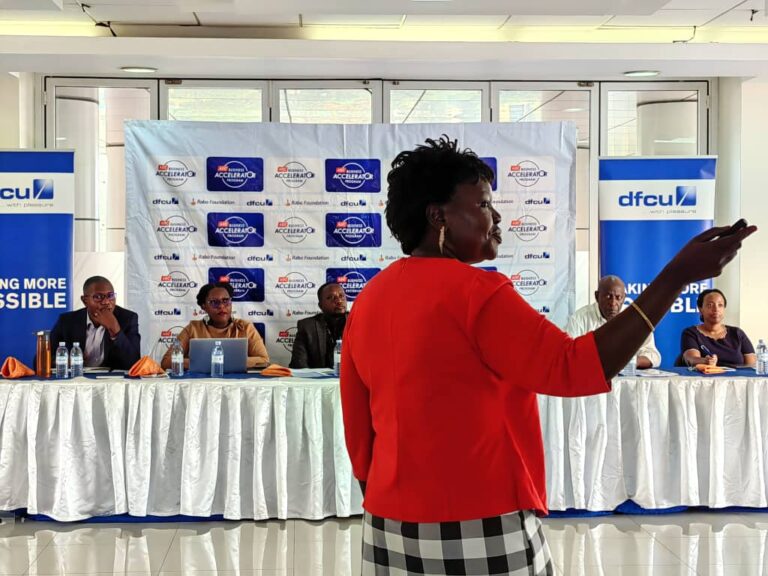
Dfcu Bank in partnership with Agri-Business Development Centre (ADC) have opened doors for women led small and medium sized enterprises (SMEs) to present their business ideas for financing.
The move is running under Business Accelerator Program, and aims to enable the SMEs jump out of the ideation stage to profit making ventures.
The Business Accelerator Program, an initiative sponsored by dfcu bank to build capacities of agribusiness value chain enterprises for growth is implemented by the Agribusiness Development Centre (ADC) with a purpose to attract investor firms for funding opportunities and linkages to finance.
On Friday, various women led businesses presented their business ideas to a panel of 6 judges at dfcu Bank in Kampala for financing.
Anthea Ibembe – the Chief Operations Officer, Apa Tea which was founded in 2011, told the judges that her enterprise is seeking $25,000 to among others purchase a teabag machine because the one in place has worked for more than a decade, and is getting faculty.
“The machinery we hope to buy – the teabag machine should be able to run us for the next decade or 15 years because the one we are currently using, we have used it for 11 years, and it is now beginning to get faulty. So, the one we hope to get which is more state of the art is much easier to maintain and produces much better teabags,” she said.

Ibembe whose enterprise produces about a ton of teabags every single week, said that if her enterprise emerges the winner, the financing received will be of extraordinary value to the enterprise.
“It [the financing] will fulfill what I would like to call operation re-premium. We are set as a premium product, we would like to redesign to be premium enough as our international competitors (to rebrand and reposition our teabag range as a premium specialty tea for a sharper competitive advantage). It will make our teabags more marketable for airlines, hotels. They would look much better, they will be more hygienic to buyers, and in the premium market, those are the two very essential things,” she said.
Asked whether her enterprise has the capacity to take and effectively utilize the money she pitched for, Ibembe said her enterprise is efficiently run with much focus on innovation and branding hence assuring investors of their money worth.
“We know that we would give the investors their dollars worth in everything we ask for, but also remain market trendy in terms of what healthy products are needed on the market, and what we can do in our reach,” she said.
Ibembe further told the panel that her enterprise’ annual revenue is $70,000, adding that the company has an opportunity to scale up to almost 6 times with expansion to all East African countries and launching new flavours.
She projected her company’s revenue for 2023 to grow by 20% to 313 million shillings.
On the other hand, Frances Eluzai – founder and CEO, Golden Basket limited which was founded in 2019 to deal in catfish and poultry told investors that her enterprise envisions to become the prime choice producer of diversified superior quality products and services that can enhance customer value, improve livelihoods and contribute towards economic growth in Africa while leveraging on the agri-business sector.
Eluzai asked for 170 million shillings which she said her enterprise is seeking for to construct and improve more structures, enlarge stock and hire more skilled workforce.

“Our request is to raise 170 million shillings through grants, soft loans and/or other financial schemes for construction, improvement of structures, facilities, equipments, stocking and manning production in the next three months: 70 million for catfish expansion from 8 to 15 metric tons capacity per season, and 100 million for poultry, raising 3,000 layers,” she said.
“Over the next 3 years, we want to be able to produce 30 tones of catfish and 26,000 trays of eggs per year,” she added.
Eluzai further told the panel of investors that the problem which is an opportunity to her enterprise is that there is shortage and inconsistent supply of quality fish poultry and eggs which fail to meet the growing market demand in the country.
Asked how her enterprise would find a solution to the challenge, Eluzai said, “production and supply of fresh quality catfish and premium yellow york eggs to ensure quality and consistent supply to meet market demand.”
Factually, women face more challenges than men in establishing, managing, growing and expanding business enterprises. They are more likely to be impeded by lack of necessary capacities, skills and resources compared to their male counterparts.
52% of Uganda’s labour force is made up of women, and approximately 75% of them are employed in agriculture sector. Interventions such as the ADC Business Accelerator Programme are key in promoting entrepreneurship and supporting women develop greater economic prosperity.